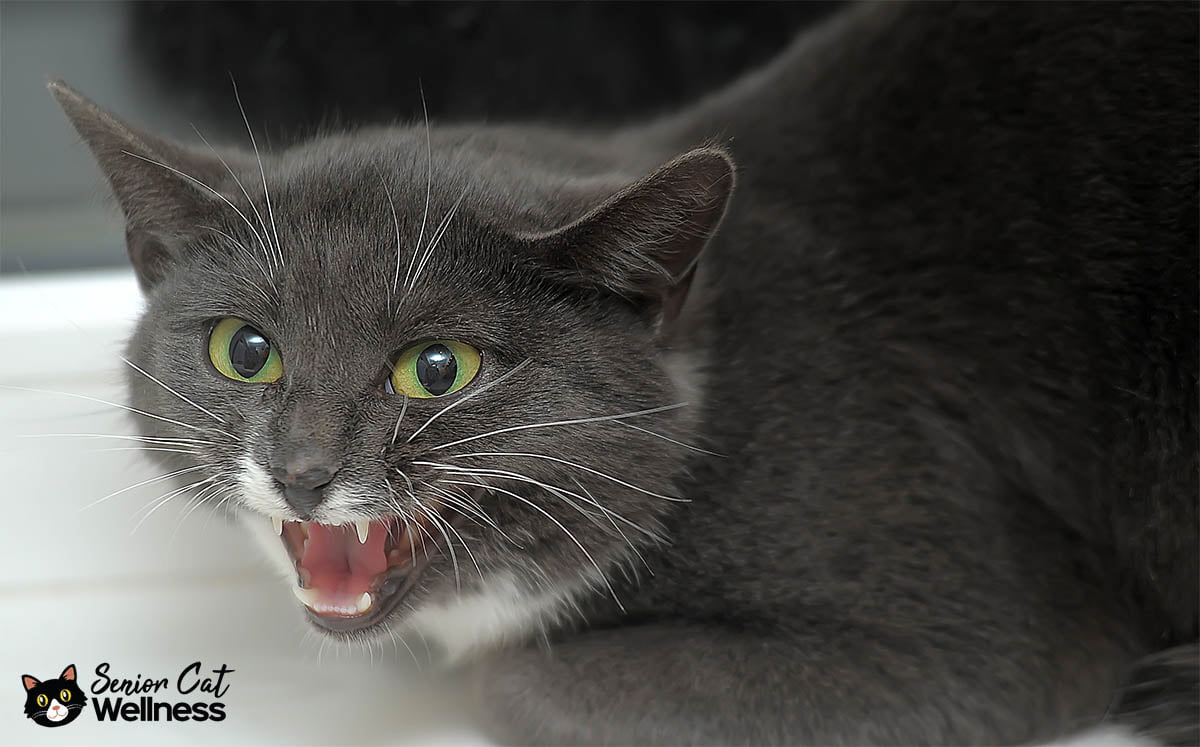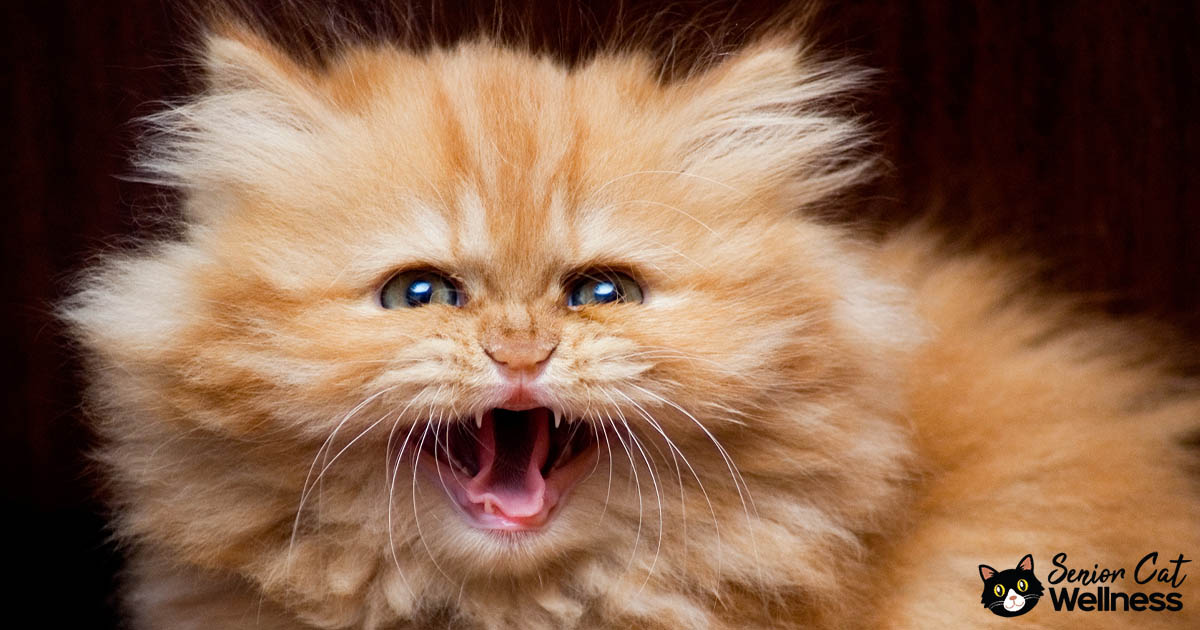Though cats are generally placid and relaxed creatures, they’ll all hiss or growl at you at some point.
While these sounds can feel quite aggressive, they’re simply your cat’s tools of communication.
Since there are many potential reasons why your cat may be hissing, it’s important to seriously consider and determine what might be behind it.
In this article, we’ll explore why your cat is hissing at you and discuss:
- The main difference between hissing and growling
- Several reasons why your cat may hiss at you
- Proper ways to respond to your cat when it hisses at you.
Let’s get into it!
Prefer a Video?
What is Hissing? Hissing vs. Growling
Hissing is a cat’s expression of feeling uncomfortable or vulnerable and is one of the most common warnings that a cat gives.
It involves a quick release of breath through the teeth, often accompanied by a curled tongue. A cat’s hair may also stand up straight, giving the cat a larger look so as to intimidate threatening predators.
On the other hand, growling originates in the throat and tends to begin with a low humming sound. A growl can be low and continuous, fluctuating in volume and intensity.
Like hissing, growling is also a verbal warning. It’s not uncommon to hear a cat alternate between hissing and growling, so it’s understandably concerning when your cat does this.
Reasons Why Your Cat May Hiss at You
Feeling Threatened or Scared
A cat’s hiss can often express their feelings of fear. They may hiss as a defense mechanism against an apparent threat in an attempt to scare it off.
You’ll also notice that your cat’s hair stands on its ends. This phenomenon, known as piloerection of the hair, is also a defense mechanism as it causes the cat to appear larger and more threatening.
Mother cats are particularly prone to hissing when protecting their litter. Sudden movements toward the kittens or the arrival of unfamiliar animals are considered threatening, prompting the mother to hiss.
Sickness or Discomfort
A cat may also hiss if it’s experiencing pain. Watch out for other signs that may accompany the hissing, such as sores, a poor appetite, or if your cat suddenly becomes more reclusive.
If you can’t find an obvious cause of their physical discomfort, you should seek advice from a veterinarian.
Territorial Disputes
Domestic cats, just like their big cat cousins, experience territorial disputes. These are common triggers of hissing and growling as they attempt to frighten rivals away from their territory.
Changes in the Environment or Routine
Cats are creatures of habit. You’ll have noticed this if you’ve ever moved a short distance and found that your cat continues to return to your old house.
If your cat is still adjusting to major environmental changes, it may express this through hissing. To assist them through this, try to provide them with familiar items they may find comforting, like a favorite blanket or cushion.
Misdirected Aggression
It may be that your cat is feeling excited or threatened by some factor and is misdirecting their expression toward you.
Perhaps they’ve spied another animal out of the window or have been frightened by a loud noise.
If they’re unable to respond to this threat directly, they may direct it toward you instead. Remain patient and consider what factors may be leading them to feel uncomfortable.
Inappropriate Play
Hissing may suddenly occur in the middle of what was previously a fun and positive playtime with your cat.
Consider whether you may have touched your cat in a sensitive spot or made some action that caused them discomfort.
Children are common recipients of a cat’s hissing since they’re likely to make mistakes such as stroking a cat’s hair in the wrong direction or pulling its tail.
Play-induced overstimulation is something that can occur in cats during playtime. When your cat becomes overexcited, it may begin to hiss or show other signs of distress. At this point, you should move away to allow your cat some time to relax.
How to Respond When Your Cat Hisses at You
For the well-being and safety of both you and your cat, you should take care to respond appropriately to their hissing. You may be able to help them independently. Otherwise, you’ll need to seek advice from a veterinarian.

Respect Their Need for Space
Though they enjoy the occasional cuddle, most cats are independent animals that enjoy their own space — and plenty of it!
If you’re touching your cat or are in its personal space and it begins to hiss, move away immediately. It may be that your cat just needs some space to calm down and recover from its feeling of vulnerability.
When your cat is ready again for snuggles, it’ll make its way to you on its own accord.
Provide Hiding Places and Escape Routes
Cats feel most comfortable when they’re in control of their surroundings. If they have easily accessible escape routes and places to hide away, then they’ll feel much more at ease.
This is particularly important if you’re hosting guests and even more so if these guests are children or animals.
If you don’t have a cat flap, make sure that there’s a door or window through which they can escape.
Allow Time to Calm Down
As mentioned previously, cats need their space. If your cat begins to hiss, move away and allow them time and space to get over whatever it is that has frightened them.
If you have unfamiliar children or animals over at your house, be sure to provide your cat with some space hidden away from them. This way, your cat can observe these strangers from a safe distance, helping them to feel calm.
If your cats are unable to have time away from unfamiliar threats, their fear may continue to escalate.
Encourage with Food and Rewards
If your cat is feeling uncomfortable, it may be more likely to calm down with some familiar treats that make them happy.
If they are treated at times when they are feeling uncomfortable, they may eventually grow to feel comfortable in that situation.
Consultation with a Vet or Animal Behaviorist If Necessary
It could be that your cat is suffering from some internal illness or discomfort that you just haven’t noticed yet.
If you can’t work out why your cat continues to hiss, it’s advisable that you visit a veterinarian so they can investigate any underlying issues.
The Bottom Line
There are a multitude of reasons why your cat may be hissing at you. It’s important to not take it personally — most of the time, it’s not your fault, even though it might feel like it is!
However, it is your responsibility to find out what is making your cat feel uncomfortable and help them to get through it.
Continuous hissing, no matter the cause, is never positive and should be immediately investigated. If left unchecked, your cat’s anxiety may escalate and lead to a decline in its general well-being.


We have a kit kat who is now 8 years old and my husband and I have been the only adults basically in the house most of the time and my husband went away to visit our son and while he was gone our kit kat starting hiding and being non normal and stopped coming to me for pets and love and runs when he sees me and hides. When my husband came home after two weeks the kit kat is still not happy when I am around but has just recently let me pet him in his overed bed for a bit like I used to prior to my husband being gone when the kit kat would always come to my room and want treats and wants some pets and love from me. Now he doesn’t even come into my room and still is not sure he wants me around? He oes into my husband office and hides and now that my husband has been home for about a week he does go and sometimes sleeps in his covered bed in the living room. Could this whole strange reactions to him while my husband was gone and now is he getting back to normal but will take more time to come back to me and get his treats and pets and comfort? It all started after my husband when on a trip to visit our son and slowly is it going to go back to normal? He did let me pet him on his head and heck but if I moved fast or something he runs and hides????